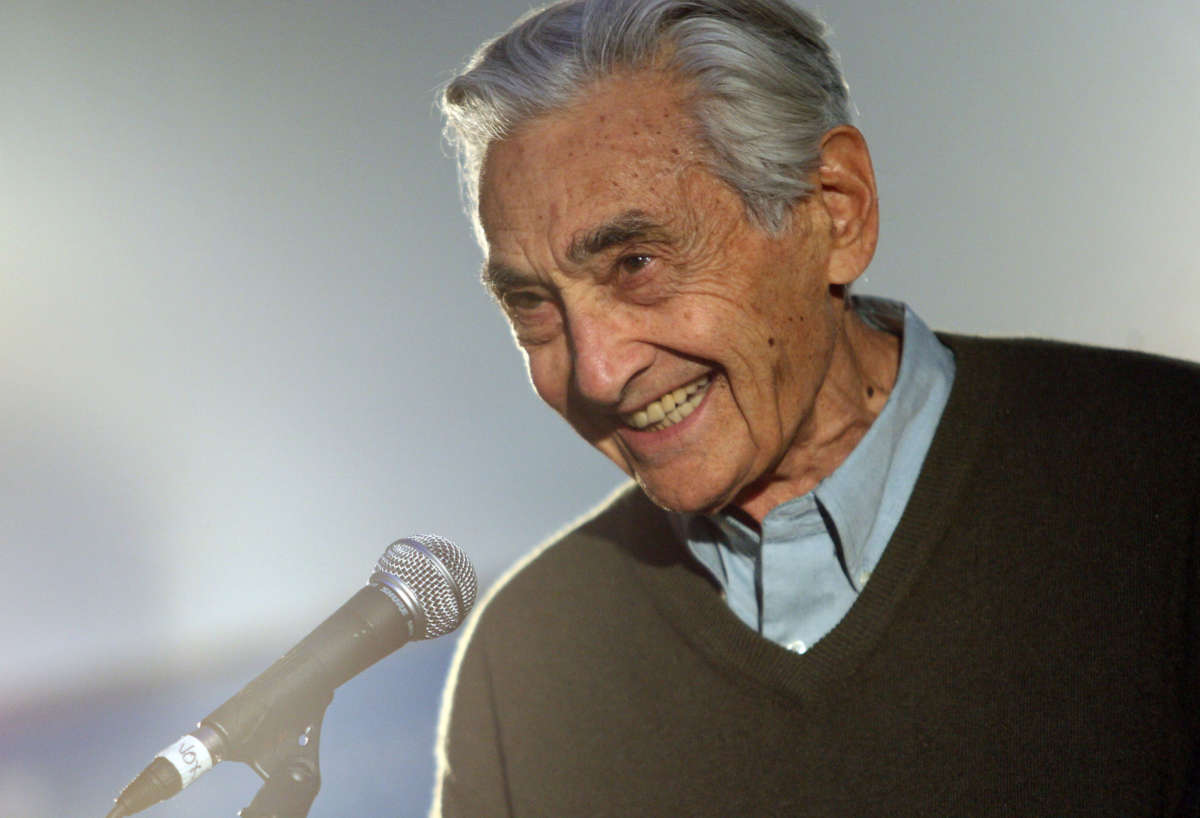In Howard Zinn’s play Marx in Soho, Karl Marx remarks, “They are all proclaiming that my ideas are dead! It’s nothing new. These clowns have been saying this for more than a hundred years. Don’t you wonder: why is it necessary to declare me dead again and again?”
Reflecting on Zinn’s death 10 years ago, the parallel is striking: the right and all too many liberals still find it necessary to attack the historian, playwright and socialist thinker because of the remarkable clarity, power and danger his ideas represent today.
When whistleblower Chelsea Manning was sentenced to 35 years in federal prison, charged with releasing classified documents, including the video of a 2007 U.S. airstrike on Iraqi civilians that killed two Reuters journalists, Manning declared: “As the late Howard Zinn once said, ‘There is not a flag large enough to cover the shame of killing innocent people.’”
Protesters have carried placards bearing this quote and many others by Zinn in marches around the globe, and graffiti artists and muralists have shared his words and image internationally.
Zinn continues to be referenced in popular culture, including recent appearances in John Leguizamo’s one-person Broadway show and television special Latin History for Morons, Ilana Glazer and Abbi Jacobson’s television series Broad City and Greta Gerwig’s movie Lady Bird.
The actor Riz Ahmed, discussing his television miniseries Englistan, told Variety that A People’s History of the United States had shown him the possibility of taking a different look at events of the past.
A People’s History of the United States, Zinn’s most famous work, challenges traditional historical narratives taught in U.S. schools, and instead focuses on the history of those often erased from textbooks. A People’s History of the United States continues to sell remarkably well, seeing a large bump after the 2016 presidential election, and has now sold more than 3.6 million copies of the U.S. edition alone. The book continues to influence how people both teach and learn history — and how they see themselves in history.
More than 100,000 teachers have registered with the Zinn Education Project, which promotes and supports the teaching of people’s history in classrooms across the country, and are using its free resources and curricula in classrooms across the country.
Throughout his life, Zinn emphasized agency, not just of heroic individuals but of people in common cause, in organizations, in social movements. And he embodied in his everyday life a spirit of joyful defiance of authority.
This is at the heart of Zinn’s radicalism, and why he remains such a threat to the establishment, whether the right or establishment liberals.
Ten years after Zinn’s death, the world is at a perilous crossroads. The great English historian Eric Hobsbawm titled his history of the years 1914 to 1991 The Age of Extremes. But that title could well describe the decade we have just collectively survived, as well as the dangerous new one we are entering.
Right-wing authoritarianism — in some cases, directly linked to newly emboldened fascist forces — is openly shaping politics in Brazil, India, the United States and beyond.
The planet is on fire, as Naomi Klein has extensively documented, and eco-fascist movements are using the environmental crisis to advance their hateful ideology.
The ultra-rich hoard wealth, while billions face displacement, hunger, malnutrition, shortened lifespans, surveillance, caging and oppression.
The powerful would like to smash our planet, and grab as much as they can while they are alive. And they want no interference from the “wretched of the Earth.”
Zinn described our world as “topsy-turvy,” and dedicated his life to turning it right side up. That is why his ideas live on. That is why so many people need to declare them dead again and again.
Writing about the great writer and socialist Kurt Vonnegut, who died three years before him, Zinn noted his “wry humor,” a trait they both shared.
Zinn then observed, “Vonnegut was often asked why he bothered writing. He answered this way: ‘Many people need desperately to receive this message: “I feel and think much as you do, care about many of the things you care about…. You are not alone.”’ Millions and millions of people, all over the world, reading him, do not feel alone. What could be a more important achievement?”
In our atomized and cruel world, the same can be said of Zinn’s remarkable life and achievement.
Zinn reminds us that we are not alone, that the only way anything has ever changed is when people collectively acted to bring about changes none of them could have imagined or achieved on their own, and that we can — and must — wrest the world from the fools who are destroying it.
Media that fights fascism
Truthout is funded almost entirely by readers — that’s why we can speak truth to power and cut against the mainstream narrative. But independent journalists at Truthout face mounting political repression under Trump.
We rely on your support to survive McCarthyist censorship. Please make a tax-deductible one-time or monthly donation.
